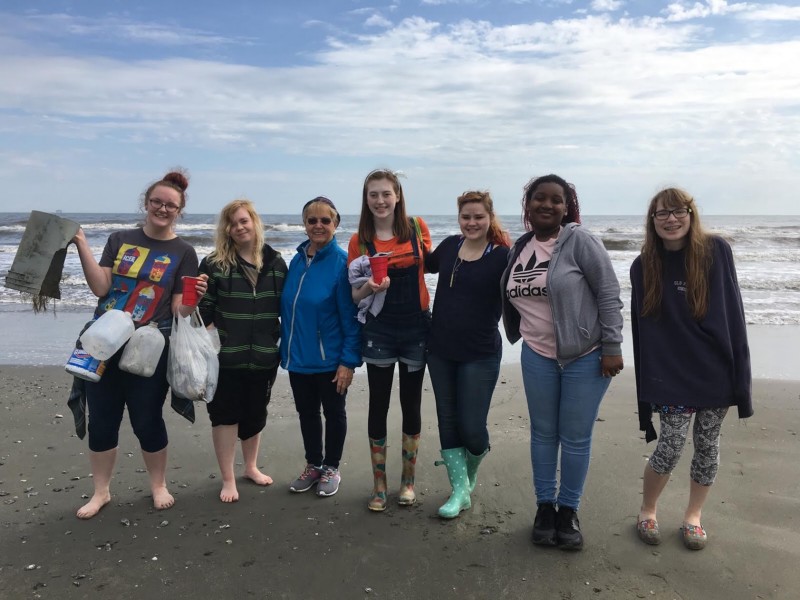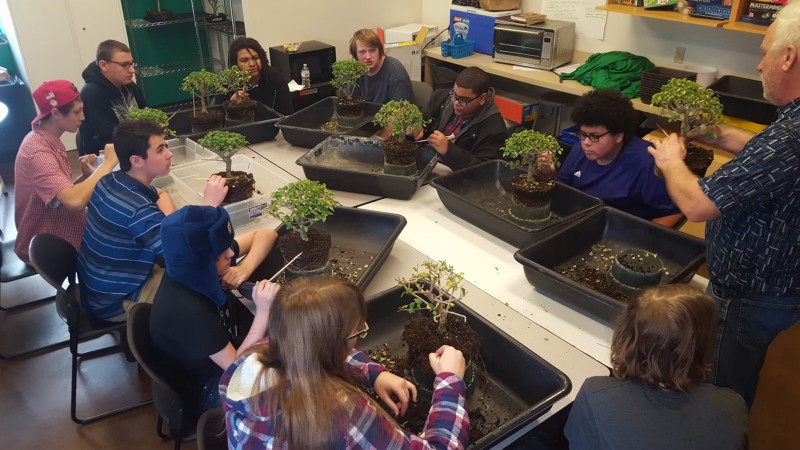Peter Wieczorek, Director of Northwest Passage High School (NWP), met with HEADRUSH to tell us more about the purpose behind their expeditionary, project-based and personalized pedagogy.
“It really came out of conversations with our students from the old model,” Peter says passionately. “Students said, ‘If I had had a smaller school, with smaller class sizes, with adults who cared about me… and had more flexibility and freedom in my academics and schedule, I might not be this far behind.’ That was the big ‘AHA’ lightbulb moment for us where we thought, ‘we can do better.’ And that’s where we started the journey looking into what we’ve been for the last 14 years.”
After having joined NPW 15 years ago, Peter has worn many hats, serving as Biology teacher, project advisor, school board member and now Director. Located in Minnesota, Peter helped facilitate the transition from what was known as the Coon Rapids credit recovery program to what is now NWP.
“We recognized early on that learning happens beyond the four walls of a school and experience is the best teacher,” says Peter. NWP today combines advisory, project based learning, interdisciplinary seminars and expeditions in order to give students a 21st century learning experience like no other. Students enrolled at NWP take on varied projects, field studies and inquiry-based methods that help develop a greater sense of the world by engaging in challenging academics, structured work experience and service learning.
Here Peter guides us through the NWP journey where students take responsibility for their own educational plans, and graduate with the tools to make informed decisions about their future.

Lots of educators are talking about school culture these days. So how does NWP keep strength in school culture after 15+ years?
When we look at culture, for us it really starts with our staffing model. There is also a lot of talk right now about teacher-led, teacher-powered schools and we’re a part of that group. We were even a part of that before it was really a defined thing. As a staff, it is a shared vision. Our vision is not coming from some district administrator who is not in the building. First we have a very flat hierarchy within the staffing structure, where everyone wears a lot of different hats… I think that filters through to the students, knowing the staff is really here for them and for the school, and they take a lot of pride in what that looks like.
Is there anything actionable or intentional you do as a school to support a strong learning culture?
From the very beginning, we [staff] had to be learners. There was no real road map then for project-based learning, or for how to do the relational work we were doing in the advisory system that we have. We, as a group, were our own cohort and advisory of continual learners, and for us it has always been about that learning environment. And so again, I think it rubs off on the students- they see that we model a strong learning culture and we are able to mentor students in that process because its a lived experience for us also.
What lessons have you learned as a leader and Director while staying true to the teacher-powered model?
It really starts with losing your ego in the sense that you have to be able to share power and collaborate with people. For us, decisions are made on the ground around the table. Yeah, sure, I have to do the sign-off for the Department of Ed, or from the accountability standpoint there has to be someone where the buck stops… But it’s about letting go of that and recognizing that the power of the team is so much more important than the power of the individual, and really honoring and respecting what everyone brings to the table. We have fantastic teachers who bring a lot to the table and have added so much value.
So how long does it take to transition from a traditional model to a PBL model, or is it always in flux?
What I always caution people, and we get a lot of visitors from other parts of the state and around the country looking at what we do, I caution them as we are on this 14 year journey, and we still feel like there are many things we can do to improve. So turning it over in a year, for example, is very unrealistic and is what leads to programs failing or startups failing. You have to be able look at the transition and see that it’s going to take 3–5 years until you kind-of know what you’re doing, and then continually working to improve that.
So your students participate in regular fieldwork at NWP?
As a staff, we knew we wanted to be a school that did not fall back on old patterns where students sit in rows, take notes and are passive learners. A lot of us came from that background and so we knew the power of getting students out to experience things. On a good day, a quarter to a third of the building is out at some point during the day, doing project work and fieldwork that both students and staff are leading.

Tell me about the local project work your students engage in.
We had a student who graduated last year who was working with the Coon Creek Watershed, which is the watershed around the school that flows into the Mississippi River. One component of her project was doing frequent water quality samples at five different streams that fed into the Mississippi River within the watershed and recording her results, uploading them into the watershed database and presenting. That is an example of a kind of individual, experiential field study.
Tell me more about the expedition aspect of your school.
We amp up our fieldwork by guiding overnight learning expeditions. That gave us the opportunity to create a three level expedition experience for students. In Level 1, the trips are shorter, typically one night long and take place less than 100 miles away from school. Level two trips require students to spend two-three nights in an outdoor context practicing advanced leadership skills. Level three consists of seven to ten day trips spent in a wilderness context, where students back or even travel to other states. We also do an international service trip to Guatemala every year.
Who pays for these expeditions?
We budget for about 20 expeditions a year at no additional cost to students or families — that was really important to us. We wanted students to be able to earn credit for that work because it was such valuable learning and often far greater experience and than what you can get in a traditional classroom. We really felt like if we were charging for these trips, there would be an equity issue there. For those who could afford it, they could get additional credits or experiences and people who couldn’t afford it wouldn’t be able to be apart of that. That didn’t stand well with us as a staff or board. So we made the decision to allocate a certain amount of our budget every year to providing those 20 or so trips each year.
How has using HEADRUSH changed PBL management for you?
What HEADRUSH has done for us, as both staff and students, is created a much more intuitive, user-friendly interface that does a number of the things we wanted that we weren’t getting before. Some in particular are the ability to upload results, embed student work and research right within the platform. When it is done right and you set up different benchmarks, it keeps students on track, keeps them organized, helps them really do the work that sometimes can feel kinda nebulous unless you have those structures set in place. I think for staff, if you think about it, staff has an advisory of about 15 students, and each student is working on several projects at a time. There has to be a way to keep that organized and stay on top of that, and that is exactly what HEADRUSH does for staff. Being able to have one-stop for both students and staff has been really nice and simplified things in a sleek way.
So what is the secret to the success of NWP?
Autonomy with a purpose. When I say autonomy it’s really across the board. As a staff member, you can not only work within your content area but you have the ability to expand beyond that and to really pursue things that are of interest to you and your students and your not stifled by the bureaucracy. I think as a student, having autonomy when the majority of your school experience you’re told where to sit, you’re told what to study, you’re told how to do it… I’ve had students who have said, “For most of my life I have had to raise my hand to go to the bathroom.” That seems like we’re not helping prepare students for life after high school if the first thing on their mind is, “I have to raise my hand to go to the bathroom.” Our goal is to help promote and prepare students for the world after high school, and it is an incredibly autonomous world right now. That about sums it up.